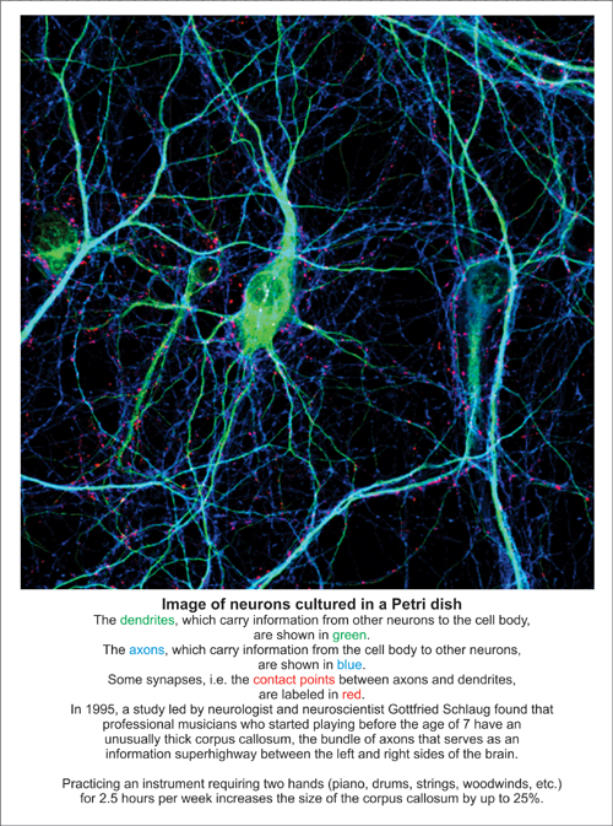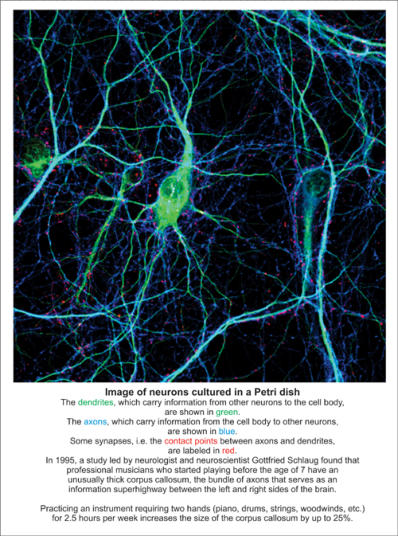RESEARCH
THE MUSIC SCHOOL, INC.
©2022 The Music School, Inc.

New Research Links Music Study and Increased Brain Size
New
research
findings
that
show
playing
a
musical
instrument
increases
the
size
of
the
sound-processing
area
of
the
brain
were
published
in
the
April
23
issue
of
Nature
magazine.
Neuroscientist
Christo
Pantev
and
colleagues
at
the
University
of
Muenster
in
Germany
used
magnetic
source
imaging
to
compare
the
brains
of
skilled
musicians
and
people
who
have
never
played
a
musical
note.
They
discovered
that
the
musicians'
auditory
cortex,
which
responds
to
pitching
a
sound
on
a
piano,
was
about
25
percent
larger
than
their
non-
musical
counterparts.
The
researchers
also
found
that
the
younger
the
musicians
began
their
training,
the
more the cortex developed.
Pantev
told
the
Reuters
News
Service
in
April
that
the
brain
processes
acoustic
stimuli,
such
as
musical
notes
on
a
piano,
as
so-called
tonotopic
maps.
Neurones--cells
that
transmit
nerve
impulses--
are
grouped
together
on
the
maps
in
the
brain
according
to
pitch.
But
because
musical
tones
are
different
from
ordinary
sounds, more neurons are needed to process the more complicated notes.
A
musician's
training
develops
the
area
of
the
brain
in
a
different
way.
More
neurones
are
involved
and
are
working
more
harmoniously,
which
Pantev
said
could
explain
how
young
musicians
develop
such
extraordinary talent. The more experienced musicians had larger tonotopic maps.
The
study
supports
earlier
research
that
showed
a
difference
in
the
part
of
the
brain
controlling
the
left
and
right
hand
fingers
of
string
musicians.
"We
found
that
the
representation
of
the
fingers
of
the
left
hand
are
bigger than the representation of the fingers of the right hand," Pantev told Reuters.
Music makes us smarter
According
to
research
conducted
at
the
University
of
California
at
Irvine.
The
positive
effect
of
music
has
been
understood
for
a
long
time.
Plato
once
said
that
music
"is
a
more
potent
instrument
than
any
other
for
education." Now scientists know why.
According
to
Newsweek
magazine,
music
trains
the
brain
for
higher
forms
of
thinking.
Researchers
at
the
UCI
studied
three
year
olds
and
found
that
after
taking
piano
lessons
and
choir
for
8
months,
they
became
expert puzzle makers, scoring 80% higher than their playmates did in spatial intelligence.
"Early
music
training
can
enhance
a
child's
ability
to
reason'"
says
Irvine
physicist
Gordon
Shaw.
According
to
researchers
these
skills
later
translate
into
complex
math
and
engineering
skills.
Shaw
believes
that
as
children
listen
to
classical
music
they
exercise
their
cortical
neurons,
which
also
strengthens
circuits
used
for
higher-order
thinking
skills.
Einstein,
who
was
a
violinist,
speaking
about
his
theory
of
relativity
said,
"it
occurred
to
me
by
intuition,
and
music
was
the
driving
force
behind
that
intuition.
The
discovery
was
the
result of musical perception."
For more information check out the UCI web site :
http://www.musica.uci.edu
Your Brain on Music
Ongoing research shows that classical music is good for the brain:
The
cerebellum
is
larger
in
classically
trained
musicians
than
in
people
who
don't
play
a
musical
instrument,
Dr.
Gottfried
Schlaug
of
Beth
Israel
Deaconess
Medical
Center
in
Boston
reported
at
the
Society
of
Neuroscience
convention
in
1998.
The
cerebellum
is
a
region
of
the
brain
responsible
for
posture,
balance,
coordination and fine motor movements.
Research
pursued
at
the
University
of
California
,
Irvine
,
led
by
psychologist
Frances
Rauscher,
Ph.D,
and
neuroscientist
Gordon
Shaw,
Ph.D.,
shows
that
there
is
"an
unmistakable
causal
link
between
music
and
spatial
intelligence,
reversing
the
once
commonly
held
view
that
music
education
is
irrelevant
to
intellectual
development."
In
this
study
in
the
mid-1990s,
researchers
concluded
that
spatial-reasoning
abilities
are
crucial
for
such
higher
brain
function
such
as
music,
complex
mathematics
and
chess.
Results
showed
that
the
spatial-
reasoning
performance
of
18
preschool
children
who
took
eight
months
of
music
lessons
far
exceeded
the
spatial
reasoning
of
a
demographically
comparable
group
of
15
preschool
children
who
went
without
music
lessons.
A
similar
study
in
the
late
'90s
by
Shaw
and
Rauscher
showed
that
children
who
received
piano
training
performed
34
percent
higher
on
tests
measuring
spatial
temporal
ability
than
children
instructed
in
computers.
"It
has
been
clearly
documented
that
young
students
have
difficulty
understanding
the
concepts
of
proportion
(used
in
math
and
science)
and
that
no
successful
program
has
been
developed
to
teach
these
concepts
in
the
school
system.
The
high
proportion
of
children
who
saw
dramatic
improvements
in
spatial-
temporal
reasoning
as
a
result
of
musical
training
should
be
of
great
interest
to
scientists
and
educators,"
the research team noted.
Students
who
study
music
scored
higher
on
both
the
verbal
and
math
portions
of
the
SAT
than
did
non-
music students, according to the College Entrance Examination Boards, as reported in Symphony, 1996.
RESEARCH
©2022 The Music School, Inc.

New
Research
Links
Music
Study
and
Increased
Brain Size
New
research
findings
that
show
playing
a
musical
instrument
increases
the
size
of
the
sound-processing
area
of
the
brain
were
published
in
the
April
23
issue
of
Nature
magazine.
Neuroscientist
Christo
Pantev
and
colleagues
at
the
University
of
Muenster
in
Germany
used
magnetic
source
imaging
to
compare
the
brains
of
skilled
musicians
and
people
who
have
never
played
a
musical
note.
They
discovered
that
the
musicians'
auditory
cortex,
which
responds
to
pitching
a
sound
on
a
piano,
was
about
25
percent
larger
than
their
non-musical
counterparts.
The
researchers
also
found
that
the
younger
the
musicians
began
their
training,
the
more
the cortex developed.
Pantev
told
the
Reuters
News
Service
in
April
that
the
brain
processes
acoustic
stimuli,
such
as
musical
notes
on
a
piano,
as
so-called
tonotopic
maps.
Neurones--cells
that
transmit
nerve
impulses--
are
grouped
together
on
the
maps
in
the
brain
according
to
pitch.
But
because
musical
tones
are
different
from
ordinary
sounds,
more
neurons
are
needed
to
process
the
more
complicated notes.
A
musician's
training
develops
the
area
of
the
brain
in
a
different
way.
More
neurones
are
involved
and
are
working
more
harmoniously,
which
Pantev
said
could
explain
how
young
musicians develop such extraordinary talent. The more experienced
musicians had larger tonotopic maps.
The
study
supports
earlier
research
that
showed
a
difference
in
the
part
of
the
brain
controlling
the
left
and
right
hand
fingers
of
string
musicians.
"We
found
that
the
representation
of
the
fingers
of
the
left
hand
are
bigger
than
the
representation
of
the
fingers
of
the
right hand," Pantev told Reuters.
Music makes us smarter
According
to
research
conducted
at
the
University
of
California
at
Irvine.
The
positive
effect
of
music
has
been
understood
for
a
long
time.
Plato
once
said
that
music
"is
a
more
potent
instrument
than
any other for education." Now scientists know why.
According
to
Newsweek
magazine,
music
trains
the
brain
for
higher
forms
of
thinking.
Researchers
at
the
UCI
studied
three
year
olds
and
found
that
after
taking
piano
lessons
and
choir
for
8
months,
they
became
expert
puzzle
makers,
scoring
80%
higher
than
their
playmates did in spatial intelligence.
"Early
music
training
can
enhance
a
child's
ability
to
reason'"
says
Irvine
physicist
Gordon
Shaw.
According
to
researchers
these
skills
later
translate
into
complex
math
and
engineering
skills.
Shaw
believes
that
as
children
listen
to
classical
music
they
exercise
their
cortical
neurons,
which
also
strengthens
circuits
used
for
higher-
order
thinking
skills.
Einstein,
who
was
a
violinist,
speaking
about
his
theory
of
relativity
said,
"it
occurred
to
me
by
intuition,
and
music
was
the
driving
force
behind
that
intuition.
The
discovery
was
the result of musical perception."
For
more
information
check
out
the
UCI
web
site
:
http://www.musica.uci.edu
Your Brain on Music
Ongoing research shows that classical music is good for the brain:
The
cerebellum
is
larger
in
classically
trained
musicians
than
in
people
who
don't
play
a
musical
instrument,
Dr.
Gottfried
Schlaug
of
Beth
Israel
Deaconess
Medical
Center
in
Boston
reported
at
the
Society
of
Neuroscience
convention
in
1998.
The
cerebellum
is
a
region
of
the
brain
responsible
for
posture,
balance,
coordination
and fine motor movements.
Research
pursued
at
the
University
of
California
,
Irvine
,
led
by
psychologist
Frances
Rauscher,
Ph.D,
and
neuroscientist
Gordon
Shaw,
Ph.D.,
shows
that
there
is
"an
unmistakable
causal
link
between
music
and
spatial
intelligence,
reversing
the
once
commonly
held
view
that
music
education
is
irrelevant
to
intellectual
development."
In
this
study
in
the
mid-1990s,
researchers
concluded
that
spatial-
reasoning
abilities
are
crucial
for
such
higher
brain
function
such
as
music,
complex
mathematics
and
chess.
Results
showed
that
the
spatial-reasoning
performance
of
18
preschool
children
who
took
eight
months
of
music
lessons
far
exceeded
the
spatial
reasoning
of
a
demographically
comparable
group
of
15
preschool
children
who went without music lessons.
A
similar
study
in
the
late
'90s
by
Shaw
and
Rauscher
showed
that
children
who
received
piano
training
performed
34
percent
higher
on
tests
measuring
spatial
temporal
ability
than
children
instructed
in computers.
"It
has
been
clearly
documented
that
young
students
have
difficulty
understanding
the
concepts
of
proportion
(used
in
math
and
science)
and
that
no
successful
program
has
been
developed
to
teach
these
concepts
in
the
school
system.
The
high
proportion
of
children
who
saw
dramatic
improvements
in
spatial-temporal
reasoning
as
a
result
of
musical
training
should
be
of
great
interest
to scientists and educators," the research team noted.
Students
who
study
music
scored
higher
on
both
the
verbal
and
math
portions
of
the
SAT
than
did
non-music
students,
according
to
the
College
Entrance
Examination
Boards,
as
reported
in
Symphony, 1996.
THE MUSIC SCHOOL, INC.
















